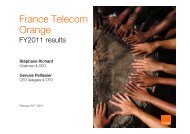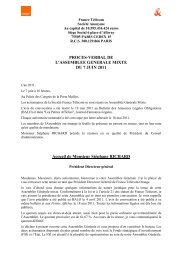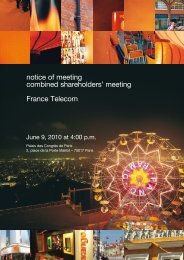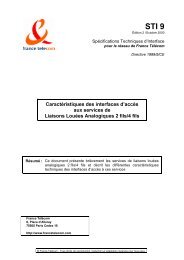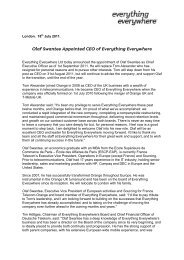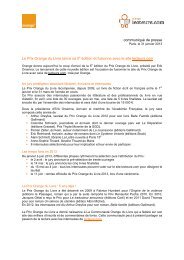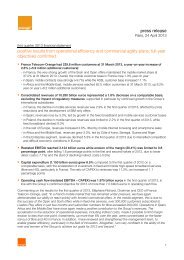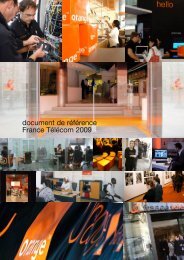- Page 1:
egistration document France Telecom
- Page 4 and 5:
2 2009 REGISTRATION DOCUMENT / FRAN
- Page 6 and 7:
table of contents 8 9 10 11 12 13 1
- Page 8 and 9:
nota This Registration Document ser
- Page 10 and 11:
1 8 2009 REGISTRATION DOCUMENT / FR
- Page 12 and 13:
2 10 2009 REGISTRATION DOCUMENT / F
- Page 14 and 15:
3 CONSOLIDATED selected financial i
- Page 16 and 17:
4 risk factors In addition to the o
- Page 18 and 19:
4 OPERATIONAL risk factors RISKS In
- Page 20 and 21:
4 OPERATIONAL risk factors RISKS Fi
- Page 22 and 23:
4 LEGAL risk factors RISKS frequent
- Page 24 and 25:
4 FINANCIAL risk factors RISKS Cred
- Page 26 and 27:
4 FINANCIAL risk factors RISKS Equi
- Page 28 and 29:
5 INVESTMENTS information about the
- Page 30 and 31:
6 THE overview of the group’s bus
- Page 32 and 33:
6 THE overview of the group’s bus
- Page 34 and 35:
6 FRANCE overview of the group’s
- Page 36 and 37:
6 OVERVIEW overview of the group’
- Page 38 and 39:
6 OVERVIEW overview of the group’
- Page 40 and 41:
6 OVERVIEW overview of the group’
- Page 42 and 43:
6 OVERVIEW overview of the group’
- Page 44 and 45:
6 OVERVIEW overview of the group’
- Page 46 and 47:
6 OVERVIEW overview of the group’
- Page 48 and 49:
6 OVERVIEW overview of the group’
- Page 50 and 51:
6 OVERVIEW overview of the group’
- Page 52 and 53:
6 OVERVIEW overview of the group’
- Page 54 and 55:
6 OVERVIEW overview of the group’
- Page 56 and 57:
6 OVERVIEW overview of the group’
- Page 58 and 59:
6 OVERVIEW overview of the group’
- Page 60 and 61:
6 OVERVIEW overview of the group’
- Page 62 and 63:
6 OVERVIEW overview of the group’
- Page 64 and 65:
6 OVERVIEW overview of the group’
- Page 66 and 67:
6 OVERVIEW overview of the group’
- Page 68 and 69:
6 OVERVIEW overview of the group’
- Page 70 and 71:
6 OVERVIEW overview of the group’
- Page 72 and 73:
6 OVERVIEW overview of the group’
- Page 74 and 75:
6 OVERVIEW overview of the group’
- Page 76 and 77:
6 OVERVIEW overview of the group’
- Page 78 and 79:
6 OVERVIEW overview of the group’
- Page 80 and 81:
6 OVERVIEW overview of the group’
- Page 82 and 83:
6 OVERVIEW overview of the group’
- Page 84 and 85:
6 OVERVIEW overview of the group’
- Page 86 and 87:
6 OVERVIEW overview of the Group’
- Page 88 and 89:
6 OVERVIEW overview of the Group’
- Page 90 and 91:
6 OVERVIEW overview of the Group’
- Page 92 and 93:
6 OVERVIEW overview of the Group’
- Page 94 and 95:
6 OVERVIEW overview of the Group’
- Page 96 and 97:
6 OVERVIEW overview of the Group’
- Page 98 and 99:
6 OVERVIEW overview of the Group’
- Page 100 and 101:
6 OVERVIEW overview of the Group’
- Page 102 and 103:
6 OVERVIEW overview of the Group’
- Page 104 and 105:
6 OVERVIEW overview of the Group’
- Page 106 and 107:
6 OVERVIEW overview of the Group’
- Page 108 and 109:
6 OVERVIEW overview of the Group’
- Page 110 and 111:
6 OVERVIEW overview of the Group’
- Page 112 and 113:
6 OVERVIEW overview of the Group’
- Page 114 and 115:
6 OVERVIEW overview of the Group’
- Page 116 and 117:
6 OVERVIEW overview of the Group’
- Page 118 and 119:
6 OVERVIEW overview of the Group’
- Page 120 and 121: 6 OVERVIEW overview of the Group’
- Page 122 and 123: 6 OVERVIEW overview of the Group’
- Page 124 and 125: 6 OVERVIEW overview of the Group’
- Page 126 and 127: 6 OVERVIEW overview of the Group’
- Page 128 and 129: 6 OVERVIEW overview of the Group’
- Page 130 and 131: 6 OVERVIEW overview of the Group’
- Page 132 and 133: 6 OVERVIEW overview of the Group’
- Page 134 and 135: 6 OVERVIEW overview of the Group’
- Page 136 and 137: 6 OVERVIEW overview of the Group’
- Page 138 and 139: 6 OVERVIEW overview of the Group’
- Page 140 and 141: 6 OVERVIEW overview of the Group’
- Page 142 and 143: 6 OVERVIEW overview of the Group’
- Page 144 and 145: 6 OVERVIEW overview of the Group’
- Page 146 and 147: 6 OVERVIEW overview of the Group’
- Page 148 and 149: 6 OVERVIEW overview of the Group’
- Page 150 and 151: 6 OVERVIEW overview of the Group’
- Page 152 and 153: 6 OVERVIEW overview of the Group’
- Page 154 and 155: 6 OVERVIEW overview of the Group’
- Page 156 and 157: 6 OVERVIEW overview of the Group’
- Page 158 and 159: 6 OVERVIEW overview of the Group’
- Page 160 and 161: 6 OVERVIEW overview of the Group’
- Page 162 and 163: 6 OVERVIEW overview of the Group’
- Page 164 and 165: 6 ENVIRONMENTAL overview of the Gro
- Page 166 and 167: 6 ENVIRONMENTAL overview of the Gro
- Page 168 and 169: 6 ENVIRONMENTAL overview of the Gro
- Page 172 and 173: 6 REGULATIONS overview of the Group
- Page 174 and 175: 6 REGULATIONS overview of the Group
- Page 176 and 177: 6 INSURANCE overview of the Group
- Page 178 and 179: 7 176 2009 REGISTRATION DOCUMENT /
- Page 180 and 181: 8 NETWORKS property, plant and equi
- Page 182 and 183: 8 NETWORKS property, plant and equi
- Page 184 and 185: 8 NETWORKS property, plant and equi
- Page 186 and 187: 8 NETWORKS property, plant and equi
- Page 188 and 189: 8 NETWORKS property, plant and equi
- Page 190 and 191: 8 NETWORKS property, plant and equi
- Page 192 and 193: 8 NETWORKS property, plant and equi
- Page 194 and 195: 8 NETWORKS property, plant and equi
- Page 196 and 197: 8 NETWORKS property, plant and equi
- Page 198 and 199: 8 196 2009 REGISTRATION DOCUMENT /
- Page 200 and 201: 9 ANALYSIS analysis of the financia
- Page 202 and 203: 9 ANALYSIS analysis of the financia
- Page 204 and 205: 9 ANALYSIS analysis of the financia
- Page 206 and 207: 9 ANALYSIS analysis of the financia
- Page 208 and 209: 9 ANALYSIS analysis of the financia
- Page 210 and 211: 9 ANALYSIS analysis of the financia
- Page 212 and 213: 9 ANALYSIS analysis of the financia
- Page 214 and 215: 9 ANALYSIS analysis of the financia
- Page 216 and 217: 9 ANALYSIS analysis of the financia
- Page 218 and 219: 9 ANALYSIS analysis of the financia
- Page 220 and 221:
9 ANALYSIS analysis of the financia
- Page 222 and 223:
9 ANALYSIS analysis of the financia
- Page 224 and 225:
9 ANALYSIS analysis of the financia
- Page 226 and 227:
9 ANALYSIS analysis of the financia
- Page 228 and 229:
9 ANALYSIS analysis of the financia
- Page 230 and 231:
9 ANALYSIS analysis of the financia
- Page 232 and 233:
9 ANALYSIS analysis of the financia
- Page 234 and 235:
9 ANALYSIS analysis of the financia
- Page 236 and 237:
9 ANALYSIS analysis of the financia
- Page 238 and 239:
9 ANALYSIS analysis of the financia
- Page 240 and 241:
9 ANALYSIS analysis of the financia
- Page 242 and 243:
9 ANALYSIS analysis of the financia
- Page 244 and 245:
9 ANALYSIS analysis of the financia
- Page 246 and 247:
9 ANALYSIS analysis of the financia
- Page 248 and 249:
9 ANALYSIS analysis of the financia
- Page 250 and 251:
9 ANALYSIS analysis of the financia
- Page 252 and 253:
9 ANALYSIS analysis of the financia
- Page 254 and 255:
9 ANALYSIS analysis of the financia
- Page 256 and 257:
9 ANALYSIS analysis of the financia
- Page 258 and 259:
9 ANALYSIS analysis of the financia
- Page 260 and 261:
9 ANALYSIS analysis of the financia
- Page 262 and 263:
9 ANALYSIS analysis of the financia
- Page 264 and 265:
9 ANALYSIS analysis of the financia
- Page 266 and 267:
9 ANALYSIS analysis of the financia
- Page 268 and 269:
9 ANALYSIS analysis of the financia
- Page 270 and 271:
9 ANALYSIS analysis of the financia
- Page 272 and 273:
9 ANALYSIS analysis of the financia
- Page 274 and 275:
9 272 2009 REGISTRATION DOCUMENT /
- Page 276 and 277:
10 274 2009 REGISTRATION DOCUMENT /
- Page 278 and 279:
11 innovation, research and develop
- Page 280 and 281:
11 278 2009 REGISTRATION DOCUMENT /
- Page 282 and 283:
12 280 2009 REGISTRATION DOCUMENT /
- Page 284 and 285:
13 282 2009 REGISTRATION DOCUMENT /
- Page 286 and 287:
14 ORGANIZATION administrative and
- Page 288 and 289:
14 ORGANIZATION administrative and
- Page 290 and 291:
14 ORGANIZATION administrative and
- Page 292 and 293:
14 ORGANIZATION administrative and
- Page 294 and 295:
14 ORGANIZATION administrative and
- Page 296 and 297:
14 ORGANIZATION administrative and
- Page 298 and 299:
14 ORGANIZATION administrative and
- Page 300 and 301:
14 STRUCTURE administrative and man
- Page 302 and 303:
14 STRUCTURE administrative and man
- Page 304 and 305:
14 STRUCTURE administrative and man
- Page 306 and 307:
14 INTERNAL administrative and mana
- Page 308 and 309:
14 INTERNAL administrative and mana
- Page 310 and 311:
14 INTERNAL administrative and mana
- Page 312 and 313:
14 REPORT administrative and manage
- Page 314 and 315:
15 RULES compensation and benefits
- Page 316 and 317:
15 TOTAL compensation and benefits
- Page 318 and 319:
15 COMPENSATION compensation and be
- Page 320 and 321:
16 318 2009 REGISTRATION DOCUMENT /
- Page 322 and 323:
17 WORKFORCE employees TRENDS The i
- Page 324 and 325:
17 WORKFORCE employees TRENDS Priva
- Page 326 and 327:
17 ORGANIZATION employees OF WORKIN
- Page 328 and 329:
17 employees COMPENSATION Z COMPENS
- Page 330 and 331:
17 employees COMPENSATION Option pl
- Page 332 and 333:
17 LABOUR employees RELATIONS Stock
- Page 334 and 335:
employees 17 TRAINING The preventio
- Page 336 and 337:
17 employees OUTSOURCING The amount
- Page 338 and 339:
17 336 2009 REGISTRATION DOCUMENT /
- Page 340 and 341:
18 DISTRIBUTION major shareholders
- Page 342 and 343:
18 340 2009 REGISTATION DOCUMENT /
- Page 344 and 345:
19 342 2009 REGISTRATION DOCUMENT /
- Page 346 and 347:
20 CONSOLIDATED financial informati
- Page 348 and 349:
20 CONSOLIDATED financial informati
- Page 350 and 351:
20 CONSOLIDATED financial informati
- Page 352 and 353:
20 CONSOLIDATED financial informati
- Page 354 and 355:
20 CONSOLIDATED financial informati
- Page 356 and 357:
20 CONSOLIDATED financial informati
- Page 358 and 359:
20 CONSOLIDATED financial informati
- Page 360 and 361:
20 CONSOLIDATED financial informati
- Page 362 and 363:
20 CONSOLIDATED financial informati
- Page 364 and 365:
20 CONSOLIDATED financial informati
- Page 366 and 367:
20 CONSOLIDATED financial informati
- Page 368 and 369:
20 CONSOLIDATED financial informati
- Page 370 and 371:
20 CONSOLIDATED financial informati
- Page 372 and 373:
20 CONSOLIDATED financial informati
- Page 374 and 375:
20 CONSOLIDATED financial informati
- Page 376 and 377:
20 CONSOLIDATED financial informati
- Page 378 and 379:
20 CONSOLIDATED financial informati
- Page 380 and 381:
20 CONSOLIDATED financial informati
- Page 382 and 383:
20 CONSOLIDATED financial informati
- Page 384 and 385:
20 CONSOLIDATED financial informati
- Page 386 and 387:
20 CONSOLIDATED financial informati
- Page 388 and 389:
20 CONSOLIDATED financial informati
- Page 390 and 391:
20 CONSOLIDATED financial informati
- Page 392 and 393:
20 CONSOLIDATED financial informati
- Page 394 and 395:
20 CONSOLIDATED financial informati
- Page 396 and 397:
20 CONSOLIDATED financial informati
- Page 398 and 399:
20 CONSOLIDATED financial informati
- Page 400 and 401:
20 CONSOLIDATED financial informati
- Page 402 and 403:
20 CONSOLIDATED financial informati
- Page 404 and 405:
20 CONSOLIDATED financial informati
- Page 406 and 407:
20 CONSOLIDATED financial informati
- Page 408 and 409:
20 CONSOLIDATED financial informati
- Page 410 and 411:
20 CONSOLIDATED financial informati
- Page 412 and 413:
20 CONSOLIDATED financial informati
- Page 414 and 415:
20 CONSOLIDATED financial informati
- Page 416 and 417:
20 CONSOLIDATED financial informati
- Page 418 and 419:
20 CONSOLIDATED financial informati
- Page 420 and 421:
20 CONSOLIDATED financial informati
- Page 422 and 423:
20 CONSOLIDATED financial informati
- Page 424 and 425:
20 CONSOLIDATED financial informati
- Page 426 and 427:
20 CONSOLIDATED financial informati
- Page 428 and 429:
20 CONSOLIDATED financial informati
- Page 430 and 431:
20 CONSOLIDATED financial informati
- Page 432 and 433:
20 CONSOLIDATED financial informati
- Page 434 and 435:
20 CONSOLIDATED financial informati
- Page 436 and 437:
20 CONSOLIDATED financial informati
- Page 438 and 439:
20 CONSOLIDATED financial informati
- Page 440 and 441:
20 CONSOLIDATED financial informati
- Page 442 and 443:
20 CONSOLIDATED financial informati
- Page 444 and 445:
20 CONSOLIDATED financial informati
- Page 446 and 447:
20 CONSOLIDATED financial informati
- Page 448 and 449:
20 CONSOLIDATED financial informati
- Page 450 and 451:
20 CONSOLIDATED financial informati
- Page 452 and 453:
20 CONSOLIDATED financial informati
- Page 454 and 455:
20 CONSOLIDATED financial informati
- Page 456 and 457:
20 CONSOLIDATED financial informati
- Page 458 and 459:
20 CONSOLIDATED financial informati
- Page 460 and 461:
20 CONSOLIDATED financial informati
- Page 462 and 463:
20 CONSOLIDATED financial informati
- Page 464 and 465:
20 CONSOLIDATED financial informati
- Page 466 and 467:
20 CONSOLIDATED financial informati
- Page 468 and 469:
20 CONSOLIDATED financial informati
- Page 470 and 471:
20 CONSOLIDATED financial informati
- Page 472 and 473:
20 CONSOLIDATED financial informati
- Page 474 and 475:
20 NON financial information concer
- Page 476 and 477:
20 NON financial information concer
- Page 478 and 479:
20 NOTES financial information conc
- Page 480 and 481:
20 NOTES financial information conc
- Page 482 and 483:
20 NOTES financial information conc
- Page 484 and 485:
20 NOTES financial information conc
- Page 486 and 487:
20 NOTES financial information conc
- Page 488 and 489:
20 NOTES financial information conc
- Page 490 and 491:
20 NOTES financial information conc
- Page 492 and 493:
20 NOTES financial information conc
- Page 494 and 495:
20 NOTES financial information conc
- Page 496 and 497:
20 NOTES financial information conc
- Page 498 and 499:
20 NOTES financial information conc
- Page 500 and 501:
20 NOTES financial information conc
- Page 502 and 503:
20 NOTES financial information conc
- Page 504 and 505:
20 NOTES financial information conc
- Page 506 and 507:
20 NOTES financial information conc
- Page 508 and 509:
20 NOTES financial information conc
- Page 510 and 511:
20 NOTES financial information conc
- Page 512 and 513:
20 NOTES financial information conc
- Page 514 and 515:
20 NOTES financial information conc
- Page 516 and 517:
20 NOTES financial information conc
- Page 518 and 519:
20 NOTES financial information conc
- Page 520 and 521:
20 DIVIDEND financial information c
- Page 522 and 523:
20 520 2009 REGISTRATION DOCUMENT /
- Page 524 and 525:
21 SHARE additional information CAP
- Page 526 and 527:
21 MEMORANDUM additional informatio
- Page 528 and 529:
21 MEMORANDUM additional informatio
- Page 530 and 531:
21 528 2009 REGISTRATION DOCUMENT /
- Page 532 and 533:
22 530 2009 REGISTRATION DOCUMENT /
- Page 534 and 535:
23 532 2009 REGISTRATION DOCUMENT /
- Page 536 and 537:
24 534 2009 REGISTRATION DOCUMENT /
- Page 538 and 539:
25 536 2009 REGISTRATION DOCUMENT /
- Page 540 and 541:
26 DRAFT 2010 shareholders’ meeti
- Page 542 and 543:
26 DRAFT 2010 shareholders’ meeti
- Page 544 and 545:
26 DRAFT 2010 shareholders’ meeti
- Page 546 and 547:
26 DRAFT 2010 shareholders’ meeti
- Page 548 and 549:
26 REPORT 2010 shareholders’ meet
- Page 550 and 551:
26 REPORT 2010 shareholders’ meet
- Page 552 and 553:
26 REPORT 2010 shareholders’ meet
- Page 554 and 555:
26 REPORT 2010 shareholders’ meet
- Page 556 and 557:
26 REPORT 2010 shareholders’ meet
- Page 558 and 559:
26 STATUTORY 2010 shareholders’ m
- Page 560 and 561:
26 STATUTORY 2010 shareholders’ m
- Page 562 and 563:
26 STATUTORY 2010 shareholders’ m
- Page 564 and 565:
26 STATUTORY 2010 shareholders’ m
- Page 566 and 567:
26 564 2009 REGISTRATION DOCUMENT /
- Page 568 and 569:
egistration document appendices TEC
- Page 570 and 571:
egistration document appendices TEC
- Page 572 and 573:
egistration document appendices TEC
- Page 574 and 575:
egistration document appendices FIN
- Page 576 and 577:
egistration document appendices ANN
- Page 578 and 579:
egistration document appendices COR
- Page 580 and 581:
egistration document appendices COR
- Page 582 and 583:
580 2009 REGISTRATION DOCUMENT / FR
- Page 584:
France Telecom Group







